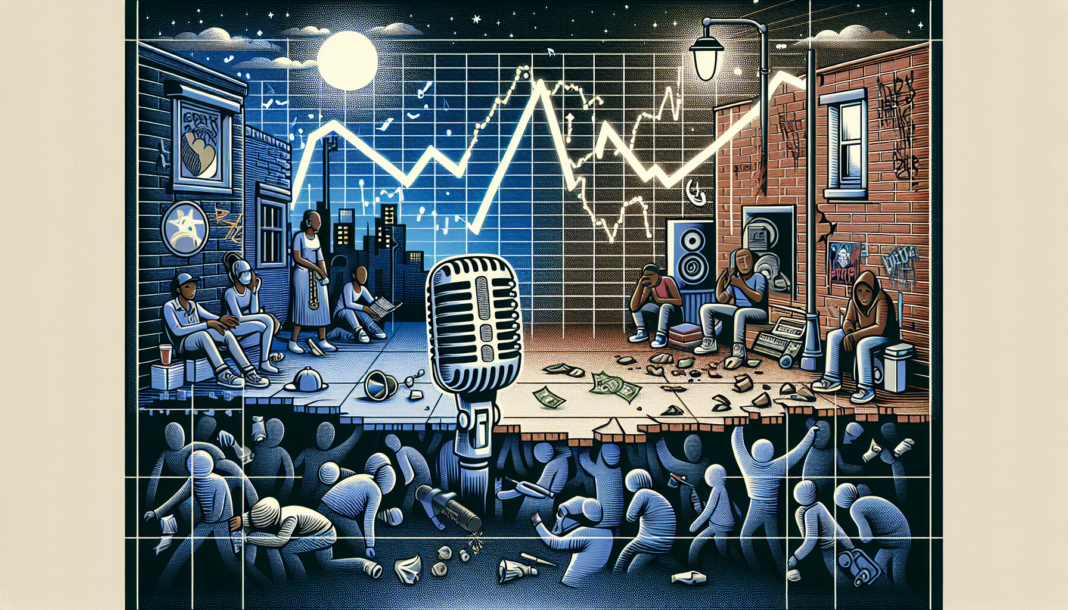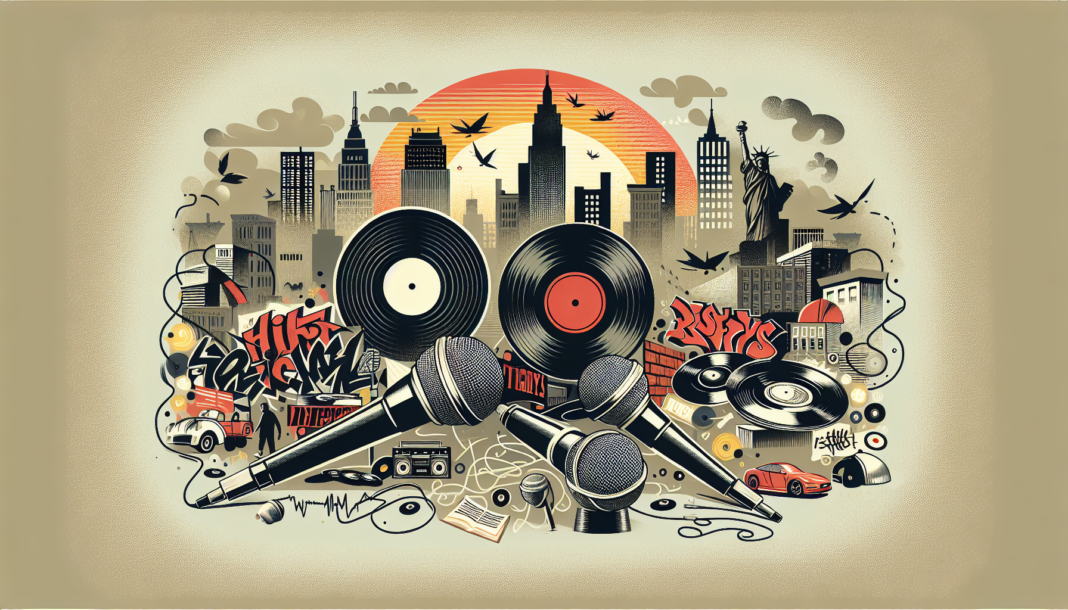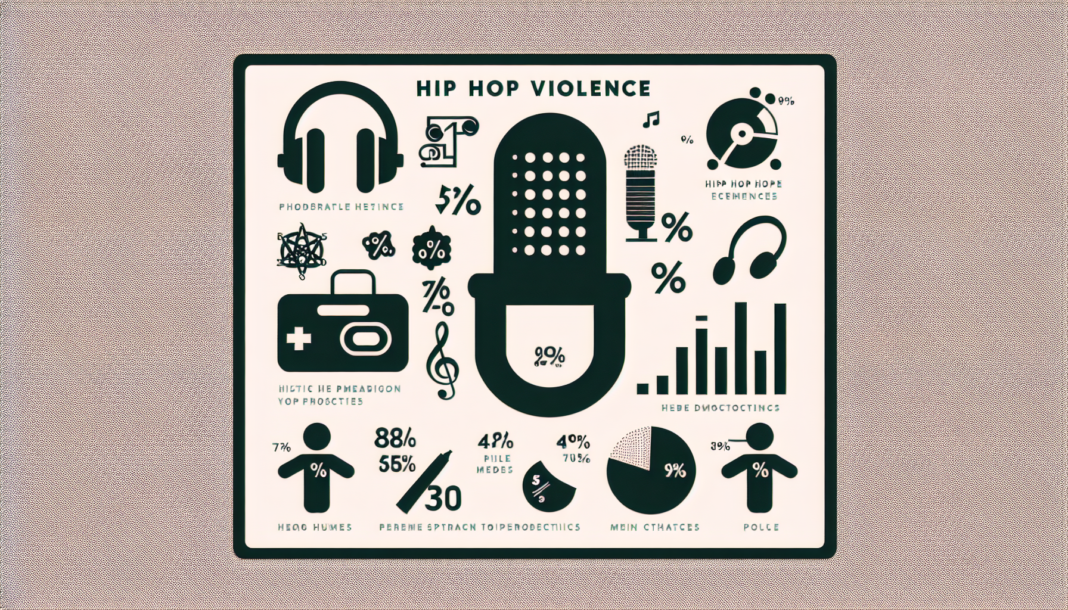Unpacking Hip-Hop Violence
Exploring the realm of HIP HOP VIOLENCE over the past 50 years, it becomes evident that this facet of the genre cannot be overlooked. Understanding the evolution of hip-hop as both a cultural and artistic movement is key to grasping the depths of the theme of violence within hip-hop narratives.
Evolution of Hip-Hop: A Cultural and Artistic Movement
Over the decades, hip-hop has transcended mere musical boundaries to become a powerful cultural force. Originating in marginalized communities, hip-hop provided a platform for expression, often reflecting the harsh realities of urban life. The evolution of hip-hop as a cultural and artistic movement has been shaped by the voices of those who have experienced violence, discrimination, and inequality firsthand.
The Theme of Violence in Hip-Hop Narratives
A prominent and contentious aspect of hip-hop has been the prevalent theme of violence in its narratives. From the early days of storytelling through music to the modern era of rap battles and provocative lyrics, hip-hop has often delved into the brutal truths of street life, gang warfare, and social injustices. This exploration of violence in hip-hop narratives serves as a mirror to the harsh realities faced by many artists and communities, shedding light on issues often silenced in mainstream conversations.
By unpacking the evolution of hip-hop as a cultural and artistic movement and delving into the theme of violence within hip-hop narratives, one can begin to comprehend the intricate relationship between music, societal struggles, and the pursuit of expression and empowerment within marginalized communities.
Influences on Hip-Hop Violence Trends
Unraveling the factors that contribute to the prevalence of violence themes within hip-hop music sheds light on the intersection of socio-political environment and systemic inequalities and marginalization.
Socio-Political Environment and Urban Realities
The socio-political landscape and urban realities play a significant role in shaping the narratives of violence in hip-hop. Urban areas plagued by poverty, crime, and lack of resources often provide the backdrop for the lived experiences and stories that artists draw upon in their music.
| Socio-Political Factor | Impact on Hip-Hop Violence Trends |
|---|---|
| Economic Disparities | Influence lyrical content reflecting struggles with poverty and survival. |
| Police Brutality | Fuel themes of resistance, injustice, and empowerment in hip-hop music. |
| Gang Culture | Shape narratives around loyalty, conflict, and violence in urban communities. |
Systemic Inequalities and Marginalization
Systemic inequalities and marginalization further contribute to the depiction of violence in hip-hop. Communities facing discrimination, limited opportunities, and institutionalized racism find a voice in the raw and unapologetic storytelling present in hip-hop music.
| Systemic Factor | Impact on Hip-Hop Violence Trends |
|---|---|
| Racial Injustice | Influence themes addressing racial profiling, discrimination, and empowerment. |
| Education Disparities | Shape lyrics reflecting struggles with limited access to quality education and economic mobility. |
| Urban Decay | Contribute to narratives portraying the harsh realities of life in marginalized urban neighborhoods. |
By recognizing the influence of the socio-political environment and systemic inequalities on hip-hop violence trends, one can begin to understand the complex weave of cultural expression, social commentary, and lived experiences within the genre. As hip-hop continues to evolve and resonate with diverse audiences, examining these influences becomes crucial in contextualizing the larger narrative of hip-hop music and its enduring impact on society.
Impact and Reflection in Hip-Hop Music
In the realm of hip-hop music, the impact of violence is a complex and multifaceted issue that has sparked discussions on the dichotomy of glorification and condemnation within the genre. Additionally, the real-life consequences of violence on artists and communities have been pivotal in shaping the narrative and identity of hip-hop.
The Dichotomy of Glorification and Condemnation
Hip-hop music often presents a paradoxical relationship with violence, showcasing a dual narrative of both glorifying and condemning violent acts. On one hand, some artists use their lyrics to portray a heightened sense of power, street credibility, and survival within harsh urban environments. This glorification of violence can sometimes perpetuate negative stereotypes and contribute to the normalization of aggression.
Conversely, many hip-hop artists also condemn violence in their music, addressing the harsh realities of societal issues, systemic inequalities, and the devastating impact of violence on communities. Through their lyrics, these artists seek to raise awareness, provoke thought, and advocate for social change, highlighting the need for peace and unity in the face of adversity.
Real-Life Consequences for Artists and Communities
The depiction of violence in hip-hop music extends beyond artistic expression, often intersecting with the lived experiences of artists and the communities they represent. Artists who have faced violence in their personal lives may channel these experiences into their music, using it as a platform to voice their struggles, advocate for justice, and shed light on the harsh realities of their environments.
Moreover, the impact of hip-hop violence trends reverberates beyond the music industry, affecting communities grappling with systemic inequalities, poverty, and urban violence. The glorification of violence in hip-hop can have real-life consequences, perpetuating cycles of aggression, influencing impressionable youth, and shaping perceptions of identity and self-worth within marginalized populations.
By critically analyzing the dichotomy of glorification and condemnation in hip-hop music and acknowledging the real-life consequences for artists and communities, we gain insight into the complex interplay between art, culture, and societal issues. This examination prompts important discussions on the role of hip-hop as a reflection of reality, a catalyst for change, and a powerful tool for amplifying marginalized voices in the ongoing dialogue on violence and social justice.
Hip-Hop as a Voice for Change
In the realm of hip-hop, music has long served as a powerful medium for addressing social issues and sparking conversations about empowerment and justice. Within this context, two key aspects stand out: the role of hip-hop in addressing social issues through music and its potential to empower communities and enact social justice.
Addressing Social Issues Through Music
Hip-hop has a rich history of delving into societal concerns and shedding light on issues that often go unnoticed or ignored. Artists use their platform to amplify voices that are marginalized, speaking out against systemic injustices such as police brutality, poverty, and racial discrimination. Through their lyrics, hip-hop artists offer a raw and unfiltered perspective on the harsh realities faced by many in urban environments.
Music acts as a conduit for conveying the lived experiences of individuals who grapple with violence and adversity on a daily basis. By weaving narratives of struggle and resilience into their songs, hip-hop artists invite listeners to engage with uncomfortable truths and challenge prevailing norms. The genre’s ability to provoke thought and evoke emotions has made it a catalyst for social change and a source of solidarity for communities affected by violence.
Empowering Communities and Enacting Social Justice
Beyond raising awareness, hip-hop has the capacity to empower communities and mobilize them towards collective action. Through their music, artists convey messages of strength, unity, and resistance, instilling a sense of pride and agency among listeners. The themes of perseverance and triumph over adversity resonate deeply with audiences, inspiring them to stand up against injustice and advocate for change.
Moreover, hip-hop serves as a platform for organizing grassroots movements and advocating for social justice reforms. Artists collaborate with activists and community organizations to address systemic inequalities and mobilize resources for underserved populations. By harnessing the reach and influence of their music, hip-hop figures play a vital role in galvanizing support for causes that aim to dismantle oppressive structures and create a more equitable society.
In essence, hip-hop’s ability to address social issues and empower communities embodies its transformative potential as a force for positive change. By amplifying marginalized voices, challenging societal norms, and fostering a sense of community resilience, hip-hop continues to shape the narrative of violence, survival, and activism in ways that resonate with diverse audiences and spark meaningful dialogue on pressing social issues.
Examining Hip-Hop’s Legacy
Historians’ Perspectives on Hip-Hop Evolution
Historians play a pivotal role in contextualizing the evolution of hip-hop music over the past five decades. By tracing the cultural, social, and political landscape in which hip-hop emerged, historians provide valuable insights into the genre’s transformation from a grassroots movement to a global phenomenon.
One aspect that historians focus on is how hip-hop has transcended its origins in the Bronx to become a powerful form of expression for marginalized communities worldwide. They analyze the influences that have shaped hip-hop’s sound, style, and message, highlighting the genre’s ability to reflect the lived experiences of those often overlooked by mainstream society.
Documenting the Socio-Political Impact of Hip-Hop Violence
In documenting the socio-political impact of hip-hop violence trends, historians delve into the complexities of how violence has been portrayed and perceived within the genre. They examine how hip-hop has served as a mirror reflecting the harsh realities of urban life, including systemic inequalities, poverty, and violence.
Through a historical lens, historians analyze how hip-hop has been a platform for artists to address social issues such as police brutality, gang violence, and economic disenfranchisement. By documenting the socio-political impact of hip-hop violence, historians contribute to a deeper understanding of how the genre has both mirrored and challenged the prevailing power structures and societal norms.
By examining hip-hop’s legacy through the perspectives of historians, we gain a comprehensive understanding of the genre’s enduring influence on music, culture, and social change.
Critical Analysis and Discussion
In the realm of hip-hop music, cultural critics play a crucial role in dissecting the intricate layers of lyrical content and themes present in the genre. Their interpretations often shine a light on the societal implications of hip-hop violence trends and how they reflect and interact with broader cultural norms and realities.
Cultural Critics’ Interpretations
Cultural critics delve deep into the themes of violence portrayed in hip-hop music, analyzing the nuances of lyrics, storytelling, and messaging. They explore how these narratives either perpetuate harmful stereotypes and behaviors or serve as a reflection of the harsh realities faced by marginalized communities. By critically examining the role of violence in hip-hop, cultural critics contribute to a broader conversation about representation, authenticity, and accountability within the genre.
Educating and Mentoring Through Hip-Hop Narratives
Beyond critique, hip-hop narratives have the power to educate and mentor listeners, particularly youth and urban communities. Artists often use their platform to share personal experiences and insights, offering mentorship through their music. These narratives can serve as a form of guidance, empowerment, and storytelling, shedding light on the struggles and triumphs of individuals facing adversity. By engaging with hip-hop narratives, audiences have the opportunity to learn from lived experiences and gain a deeper understanding of the societal issues embedded within the music.
Through critical analysis and discussion, cultural critics and educators alike navigate the complex terrain of hip-hop violence trends, shaping the dialogue surrounding the genre’s impact on society and its potential for positive change.






